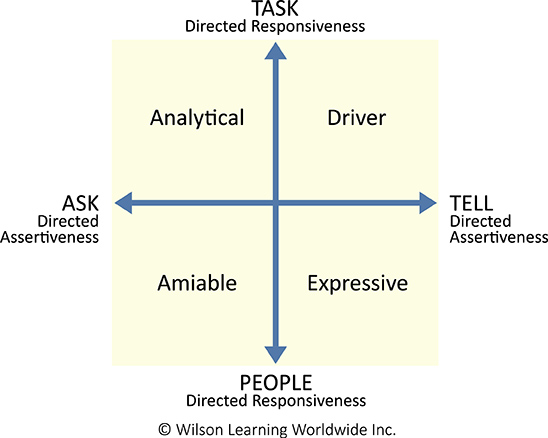Leadership Versatility
A Leader's Most Powerful Skill

We have experienced countless changes this past year and counting. Many of these changes have affected how people work together and, as a result, we have seen a rise in interpersonal conflict and stress, as well as a loss of engagement. We believe versatility in leadership is a skill that can be learned.
What if your leaders could learn a skill that would reduce conflict, increase engagement, and speed up decisions? What if I told you that this skill could increase productivity by up to 56%? Would you be interested?
This skill is called leadership versatility and is perhaps the most important skill for your leaders to develop. Even in today’s Hybrid work environment, where everything has changed, the fact is that nothing has really changed in the skill and practices that underlie leadership versatility.
In Training magazine’s annual survey on leadership development, leadership communication skills has ranked as the first or second highest priority skill needed by leaders every year of the survey.1 Leaders who understand differences in others’ communication preferences and learn to adapt their own communication to make others more comfortable are more effective and have more effective work groups.2 As the speed and complexity of business intensifies and organizations grow more diverse, the need for more versatile communication skills becomes critical to success.
Leadership versatility allows leaders to take responsibility for managing their communication behavior and reducing interpersonal tension, keeping the team focused on solving problems, improving innovation, managing complex projects with tight deadlines, and achieving improvements of productivity, efficiencies, and employee engagement.
The Key to Effective Communication
Versatility is the ability to: (1) understand differences in communication preferences and (2) adapt to others’ preferences to make them more opening and receptive—creating more effective and productive relationships.

A half a century of research shows that people have predictable patterns of communication; we call this Social Style. Social Style is determined by actions and behaviors along the dimensions of Assertiveness and Responsiveness. Because about 25% of people fall into each of the four Social Styles, a leader shares a style with only about 25% of his or her colleagues and direct reports and, as a result, all leaders face the dilemma of creating effective communication with the remaining 75%.
Consider people with whom you have regular contact. Do some of your colleagues seem “too quiet and reserved”? Is there a direct report who seems “too emotional”? Are some of your coworkers “too willing (or unwilling) to compromise”? Your reactions to these people are most often an indicator of a difference in Social Style. When you find it easy to communicate with someone, you likely share the same Social Style; when there are difficulties in communication, it is often because of unrecognized Social Style differences.
The Key Is Versatility
Understanding Social Style allows leaders to recognize communication preferences; versatility allows them to adapt to others to improve communication and relationships. Versatility is the key to performance improvement.
The good news for your leaders is that versatility is a skill that they can learn and master. Leaders who learn how to be versatile excel. Those that don’t miss out.
Versatility as a Leadership Skill
Being a versatile leader requires effort. It requires leaders to recognize others’ Social Style and then adjust their behavior, temporarily, to make others more comfortable, even if it means becoming uncomfortable themselves. Leaders have to make a conscious choice to be versatile.
When is it most important for a leader to be versatile? To answer this question, we have conducted a series of studies over the past several years, interviewing hundreds of leaders and those leaders’ direct reports. The research indicates that leaders need to pay attention to certain critical moments that matter most:
- When the relationship is important to achieving success
- When the risks of a poor relationship are high
- When interpersonal tension can get in the way of effective work and performance
- During times of conflict or potential conflict
- When coaching or giving performance feedback, especially when it is corrective feedback
The need for leadership versatility becomes apparent in several ways.
Giving Direction
While all employees want clear and meaningful direction, how a leader delivers that direction can have a large impact on performance. Drivers and Analyticals, for example, are more engaged when they receive just the right amount of direction, not too much and not too little. They don’t want to have to dig for information you already have but are also hampered by information that is irrelevant to the task at hand. In contrast, Expressives become disengaged when they feel the level of direction leaves only one way of approaching the task; they want to discuss options. Amiables excel when they understand the impact of the direction on others.
Giving Support and Coaching
While all employees need support and coaching from time to time, how that support is provided can be critical. For example, Analyticals are more comfortable when they can make decisions and then receive direct feedback and clear acceptance on those decisions from the leader. Expressives, on the other hand, are more comfortable with a sounding board—a leader who will discuss options with them before they make a decision.
Leaders who provide support in the way they themselves might want to be supported may not be providing the kind of support the employee needs to be effective.
Recognizing When to Give More Responsibility
All good leaders challenge their direct reports by giving them increasing levels of responsibility, but our research shows that employees of different Social Styles show their readiness for more responsibility differently. Drivers and Analyticals show their readiness by repeatedly exceeding expectations on current tasks. In contrast, Expressives and Amiables are more likely to ask directly or express a willingness to do more.
One of the biggest mistakes leaders make is in assuming that people show their interest in more responsibility the same way they themselves would. An Expressive leader might assume that an Analytical employee is not ready for greater responsibility because they have not asked for it. Or, in contrast, an Analytical leader may not respond to an employee’s willingness to do more and just focus on the data. Both reactions reduce engagement and lower performance.
Developing or Losing Trust
Trust is essential in leadership. When trust is lost, it can affect the whole organization and result in increased workplace tension and lower productivity. People of different Social Styles lose trust for different reasons. For Drivers, it is the breaking of confidence that results in loss of trust. For Expressives and Amiables, it is the perceived lack of support. And for Analyticals, it is inconsistent feedback.
One interesting finding involves efforts to reestablish trust. For Amiables and Analyticals, reestablishing trust inevitably involves the passage of time—efforts to reestablish trust immediately after an incident will fail, and only “time heals wounds.” This is particularly important information for Driver and Expressive leaders who may attempt to reestablish trust too early, only to increase the resistance of the Amiable or Analytical employee and further delay the reestablishment of a productive relationship.
Impact of Versatility on Leader-Employee Relationships
Employees don’t leave companies; they leave managers!
Versatility is associated with success in sales, leadership, negotiations, consulting, customer relationships, and a host of other functions. Regardless of where you are in the organization, equipping your leaders with versatility skills enables them to address complex challenges, reduce tension and conflict, build a more collaborative team, and create a more innovative and creative organization.
Versatility is the key.
To learn more, contact Wilson Learning at 1.800.328.7937 or complete the online form.







 Please complete this form to download Leadership Versatility | A Leader's Most Powerful Skill.
Please complete this form to download Leadership Versatility | A Leader's Most Powerful Skill.



